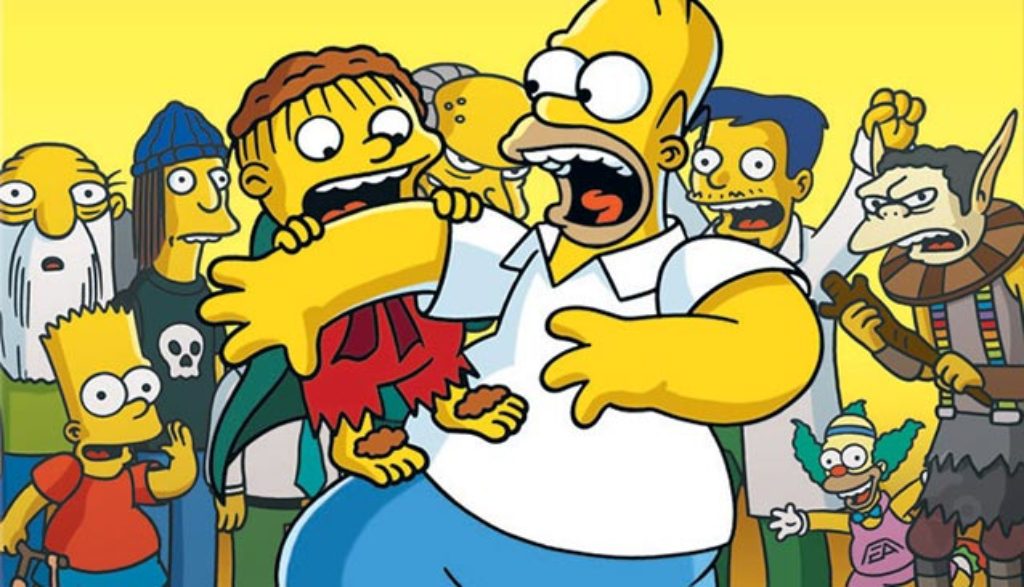
Whether you’ve been a closet Homer and Marge fan since their Tracey Ullman Show origins or you’re more inclined to picket Fox for giving this yellow-skinned, thickheaded family their own prime-time slot, there’s no denying that The Simpsons have had quite an impact on America’s TV viewing culture. This popular animated riff on Middle America has even initiated words and catchphrases officially incorporated into the Oxford English Dictionary. (D’oh!) And I, personally, am looking more and more like Homer with each passing year. (Double d’oh!)
Over the years, there have been a number of attempts to capture the Simpson family’s animated panache in a video game. More often than not, it hasn’t been pretty. But get ready to either take another bite of (mmmm!) donut or have a cow, because I can say without hesitation that EA Games, teamed with the TV show’s Emmy award-winning writing team, have finally nailed the worldview and rough-edged sitcom-style humor of all things Springfield in The Simpsons Game.
A Game Within a Game About a TV Show About You
Gameplay in this episodic adventure is lightweight and essentially a lot of platform jumping, puzzle-solving and simple fighting. It all begins when young Bart sets off to buy an M-rated video game from the corner game store and stumbles over a manual for a game called The Simpsons Game. If this mysterious book can be trusted, it seems to convey that he and his family are little more than characters in a video game.
More important to Bart, though, it says they can access special superpowers to save their pixelated Springfield from an impending attack by space aliens.
Bart, for instance, can transform into Bartman and use his cape to float while jumping. Homer can belch toxic fumes and has the power of his donut-gulping appetite to become a rolling and demolishing ball of flab. Marge is equipped with a megaphone that gives her the power of moral persuasion—she can gather a posse of passersby who carry out her beat-up-bad-guys-and-rebuild-the-community bidding. Lisa wields her saxophone to stun and turn enemies. And even little Maggie crawls into puzzle-solving action from time to time.
The Game’s a Joke and the Joke’s on the Game
Besides supplying fans with inside jabs and typical slams on pop culture, The Simpsons Game (the one I’m writing about, not the one Bart finds in the game I’m writing about) gives a few noogies to gamers as well. Players make their way through 16 different levels—including a Medal of Honor parody called “Medal of Homer,” a Japanese gaming spoof called “Big Super Happy Fun Fun Land” and a chapter where Marge rallies the neighborhood together to protest violence in the new game “Grand Theft Scratchy.” Along the way, the gang takes shots at gaming industry icons such as Mario, Sonic the Hedgehog and the Madden football players.
This all makes for a zany time as the Simpson clan tries to figure out why they and their fellow Springfieldians (including Lenny and Carl, Chief Wiggum, Krusty the Clown and more than 100 others) are trapped inside that pesky video game you’re now reading about.
Two Decades of Lobbing “Loser”
But tagging along with the craziness are irreverent situations and edgy dialogue that families will find ill-suited to a kids’ game. Case in point: When Bart first spies the mysterious game manual, he spouts, “The only Simpsons game I remember is when we all pretend Dad isn’t an alcoholic.” And when given his turn at play, Bart loves to cheer, “Kick a–!” Adult characters don’t often offer very positive role-model behavior either. One, for instance, comments that Marge’s eyes look like “boobs.” Another fellow asks, “Who do I have to screw to get a cup of coffee around here?” Offerings of words such as “d–n,” “h—” and “butt” sprinkle the more than 8,000 lines of dialogue.
Things get spiritual, but no better, when Lisa sits cross-legged at special Buddhist shrine checkpoints to manifest a giant “spirit hand” that moves large objects and blasts enemies. And late in the game, Homer’s crew makes its way up to heaven to meet with a video game-addicted Almighty whom Bart addresses as “Loser.” God’s most memorable line? “Screw this, I’m getting a beer,” just before dropping a partially bleeped f-bomb.
These kinds of crude, disrespectful antics aren’t new or surprising, of course. Bart has always been a raw-mouthed, bare-backsided rebel-without-a-clue and Homer has always enjoyed heaping sadistic torment on his God-fearing neighbor, Ned Flanders. As I said, the EA creative guys have pretty much nailed it. And that makes this game within a game about a TV show simply 10 or so hours more of the same cartoon that lots of parents have been trying to steer their kids clear of for almost twenty years.

After spending more than two decades touring, directing, writing and producing for Christian theater and radio (most recently for Adventures in Odyssey, which he still contributes to), Bob joined the Plugged In staff to help us focus more heavily on video games. He is also one of our primary movie reviewers.